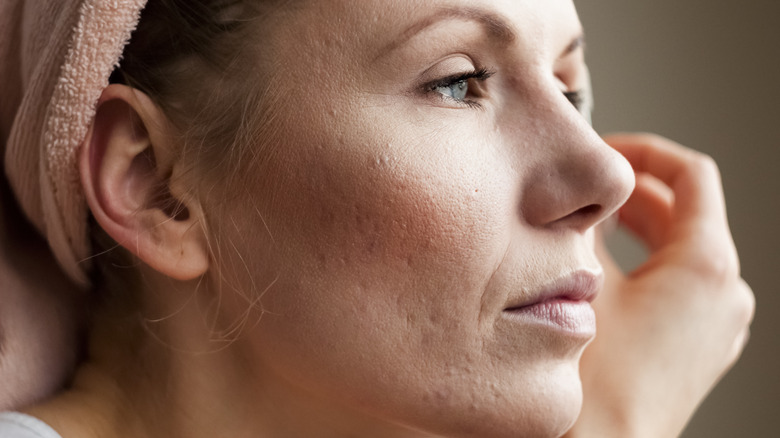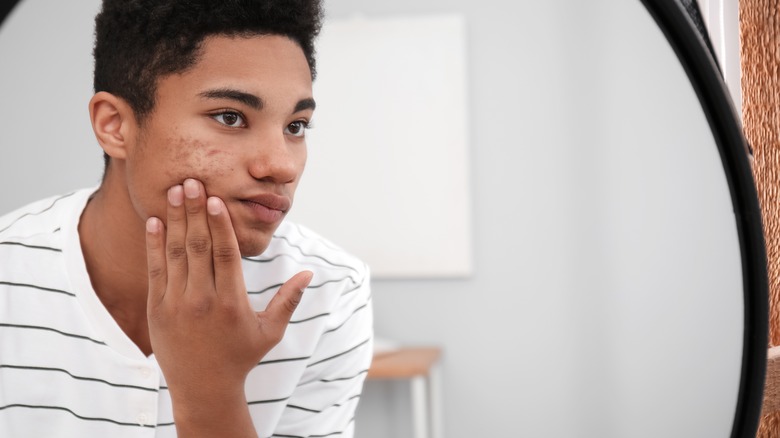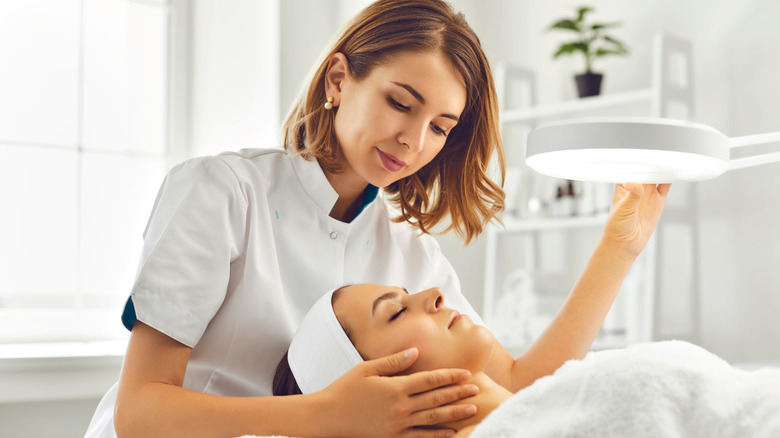Will Acne Scars Go Away On Their Own?
Red bumps and blackheads and white pustules, oh my! There are several different types of acne, each with its own causes and characteristics. One thing they have in common, though, is that they can sometimes lead to scarring. According to Cleveland Clinic, around 20% of people with acne develop scars.
Large, deep acne spots such as papules, pustules, nodules, and cysts are the most likely types to scar the skin. However, other factors, such as genetics, can play a role in the formation of acne scars (per the American Academy of Dermatology Association). Picking at blemishes or not treating inflammatory acne can also make some people more likely to get scars later.
Even if you keep your hands off your face and apply acne-fighting products, you may still be left with scars after the acne has cleared up. Rather than stress over these marks — which may only trigger more breakouts if you're already prone to acne, according to Medical News Today – it may be better to wait patiently for scars to fade. But do spots go away on their own, and how long does it take to repair your complexion?
Some acne scars never go away naturally
Just like how there are different types of acne spots, there are also different types of acne scars. Healthline lists five basic types: boxcar (box-shaped indentations), ice pick (narrow scars), rolling (shallow and uneven scars), hypertrophic and keloid (raised spots of scar tissue), and post-inflammatory hyperpigmentation (dark or red spots left on the skin after acne has healed).
Hyperpigmentation isn't technically considered a scar, though it can still be just as frustrating to deal with. However, these discolored marks will typically fade naturally over time, as long as the skin is protected from sun exposure, which may make hyperpigmentation worse, according to Acne.org.
Hypertrophic scars generally become less noticeable with time (per Medical News Today). Keloid scars, on the other hand, do not fade on their own, according to the American Academy of Dermatology Association.
Boxcar, ice pick, and rolling scars can be difficult to treat, and Healthline notes that there are no quick fixes for these depressions in the skin. Even with treatment, these scars may not disappear completely — and if the treatment is not effective, there's a chance it could create a new scar.
How to fade acne scars
Many types of acne scars don't go away on their own, but treatments can improve their appearance over time. Hyperpigmentation is the easiest to fade, often requiring only over-the-counter products. Everyday Health recommends skincare containing retinoids, kojic acid, or vitamin C. Just be careful with timing if you decide to use more than one of those ingredients — for example, vitamin C should generally not be used at the same time as retinol. It's also important to apply sunblock with an SPF of at least 50 before heading outdoors.
Other marks left behind from acne likely won't fade without help from a dermatologist, according to Cleveland Clinic. Chemical peels, laser resurfacing, microneedling, fillers and steroid injections, and several other in-office treatments are available for stubborn spots. For scars that don't respond to standard treatments, surgery may be necessary to completely remove the scarred area (per Mayo Clinic).
While these products and procedures can change the look of your complexion, they aren't generally required to have healthy skin, notes Cleveland Clinic. Ultimately, it's a personal choice to treat acne scars or let them be.



